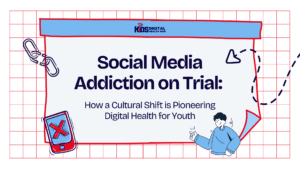What happens when protecting children takes a back seat to bureaucracy, miscommunication, or worse—inaction?
In one of the most emotionally charged and urgent episodes of the Screen Guardians Podcast, host Katie Longhauser and co-host Detective Kevin Cronister dive deep into a real-life case that shocked a local school community and ignited a movement for legislative change.
In February 2024, a shocking incident occurred at Blue River Elementary School in the Blue Valley School District of Kansas. A registered sex offender, convicted of possessing hundreds of hours of child sexual abuse material (CSAM), was granted permission to attend a K–5 school dance—an event filled with children as young as five.
Yes, it was legal. And yes, it could very well happen again.
In this follow-up, we bring you the firsthand voices of the parents who experienced this violation of trust and are now pushing for statewide legislative change and urgent school policy reform.
This isn’t just their story—it’s a call to action for every parent, educator, and policymaker.
Let’s dive in.
Table of Contents
Kansas school law sex offender Story
For a detailed breakdown of the timeline, initial fallout, and legal loopholes that allowed this to occur, be sure to check out Episode 7 of the Screen Guardians Podcast, titled “When Schools Fail: A Predator at the Dance” 🔗
How would you feel if you learned a registered sex offender attended your child’s school dance—legally?
That’s exactly what happened at Blue River Elementary in the Blue Valley School District in Kansas. In February 2024, a man convicted of possessing and distributing child sexual abuse material (CSAM)—also referred to as child pornography—was allowed to attend a school-sponsored event surrounded by children as young as five.
Even more staggering? He was there with permission from the school principal. And it was all legal under current Kansas laws.
This real-life incident ignited outrage across the parent community and exposed glaring gaps in school policy, state legislation, and overall child safety protocols. For parents, educators, and lawmakers alike, it raises urgent questions:
- What laws actually protect children in schools?
- Are registered sex offenders allowed on school grounds?
- Why don’t more school districts have policies in place?
- And what can parents do to advocate for safer schools?
In this article, we explore the events through the eyes of two brave parents, Jessica and Colter, and offer an unflinching look at what’s broken in our system—and what must urgently be fixed.
Let’s get into the full story, and most importantly, how you can help create real change.
Guest Parents Jessica & Colter Speak Out
Our guests, Jessica and Colter, are parents in the Blue Valley School District (Kansas) and witnesses to an event that shook their school community to its core. Together, they bravely share how their concerns were sparked after a registered sex offender—convicted of possessing and distributing child sexual abuse material (CSAM)—was allowed to attend a Sweetheart Dance at Blue River Elementary School, surrounded by children as young as five.
“We couldn’t believe this was actually allowed. We were told that no laws or school policies prohibited it.” — Jessica
🛑 What Happened?
In February 2024, a man who had served over eight years in prison for heinous CSAM offenses attended a Blue Valley elementary school dance with his fiancée’s child.
How did this happen?
- He asked the school principal for permission to attend.
- The principal granted permission, unaware—or perhaps indifferent—to the full implications.
- There was no policy in place at the school or district level preventing registered sex offenders from attending school events.
What’s more alarming? No state law in Kansas prohibited it either.
🔎 Key Takeaways from this Episode
- This crime isn’t victimless.
- Kevin Cronister, who has extensive experience in cyber forensics and child exploitation investigations, explains:“Every image or video involves a real child— a real crime. Possession fuels demand.”
- Statistically, individuals convicted of CSAM offenses are at high risk of reoffending.
- In fact, Kevin cites studies showing they are more likely to reoffend than someone who committed a physical act of abuse once before.
- Jessica and Colter’s advocacy sparked statewide awareness.
- After speaking out publicly and working with Senator Kellie Warren, a bill was introduced to change Kansas state policy.
- Bill 288 proposes banning registered sex offenders from school property, events, and student proximity—even if granted permission.
View the Sex Offender Registry for Your State.
How the School Reacted…Or Didn’t
Jessica shares that not only did the principal initially refuse to remove the sex offender from the dance, but when pressed by parents, she said:
“Fine, I’ll ask him to leave, but I’m leaving too.”
The principal and offender walked out—leaving the PTA alone to oversee the remainder of the dance.
Meanwhile, concerned parents recorded video proof of the man filming children on his phone during the event, adding to the community’s horror.
👎 Lack of Transparency
Colter recalls checking the live feed of the school board meeting shortly after the incident only to find:
“They didn’t stream or post the public concerns. Parents spoke out—and the board skipped over it on the official broadcast.”
⚖️ Advocating Beyond the Headlines
In emotional testimony before the Senate, Jessica and other parents shared their personal experience and called for a legal wake-up.
They faced public criticism, gaslighting from community members, and even unintentionally stifled support due to fears of “hurting feelings.”
“This isn’t about judgment—this is about protection. Would you let your child sleep over at his house? Of course not.” — Colter
🧠 Why It Matters – A Message from Screen Guardians
At Screen Guardians, we teach children and families about real-world risks—not just basic digital citizenship. This episode exemplifies the gap between safety awareness and actual school policy.
This isn’t a story about one school’s oversight. It’s a systemic failure across many districts and legislative frameworks.
We stand with parents and advocates striving to:
- Create clear policy for all school districts that prioritize student safety above all else.
- Push legislation like Kansas’ Bill 288 to restrict school access to convicted CSAM offenders.
- Educate families that registry does not equal restriction—or protection—without firm policy.
- Amplify the voices of parents who are often silenced or vilified for raising uncomfortable truths.
How To Take Action: registered sex offender school laws
- 📧 Support Bill 288: Write to Senator Kellie Warren and your local representatives.
- 📢 Speak Up: Ask your district what their policy is regarding sex offender presence on campus.
- 🧠 Stay Informed + Involved: Follow Screen Guardians for updates on advocacy, student education, and policy reform.
“We can rally around sports. We can rally around holidays. But when it comes to rallying around protecting kids? Suddenly it’s controversial? That’s got to change.” — Colter
At Screen Guardians, we believe child protection must be proactive, not reactive.
That’s why we created our turnkey K–12 Digital Wellness & Safety Program to help schools go beyond surface-level digital citizenship into brain-based safety, emotional regulation, and real-world risk prevention.
Because this isn’t just a story.
It’s a reality check—and a call to action.
🛡️ Stay safe. Stay informed.










